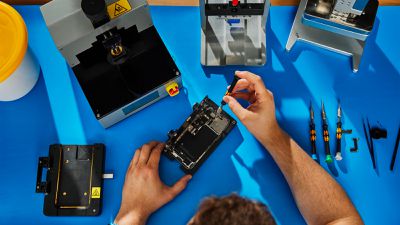iFixit Urges FTC to Establish Stronger Right to Repair Rules
Popular repair site iFixit today sent a petition to the United States Federal Trade Commission calling for new Right to Repair rules that would protect consumer interests.

iFixit's petition calls attention to some of the "blocks" that manufacturers have put in place that prevent customers and independent repair shops from repairing their electronics, such as proprietary screws or repairs that require software authentication, which is a method that Apple employs. iFixit wants the FTC to consider the following rules:
- Consumable components should be replaceable and readily available throughout a product's usable lifespan.
- Components that commonly break should be replaceable and readily available as repair parts.
- Consumers should be able to choose to take damaged products to a repair shop of their choice, or perform a repair themselves.
- When a manufacturer discontinues support for a product, its key functions should remain intact, and an independent repair shop should be able to continue to perform repairs.
- Identical components from two identical devices should be interchangeable without manufacturer intervention. (This is not the case with Apple devices).
- Independent repair shops should not be required to report customers' personally identifiable information to the manufacturer.
In France, Right to Repair laws require manufacturers to provide a device repairability score that gives context on how difficult or easy it is to repair, and iFixit says that the FTC should adopt a similar policy in the United States.
"Consider this a request for the FTC to stretch its arm out," reads iFixit's blog post on the petition. The site acknowledges that developing and enforcing any kind of rule could take years, but it is hopeful that the FTC will consider the request.
Apple in August supported California's Right to Repair law, drawing praise from iFixit, but there is no equivalent federal right to repair mandate at this time. Apple in October endorsed a push for nationwide Right to Repair law that "balances repairability with product integrity, usability, and physical safety."
Apple was supportive of California's law in particular because it requires parts to be sourced from the manufacturer, and it does not allow for parts from third-party sources. Notably, California's law does not have some of the specific provisions that iFixit is proposing, such the option to swap components from two identical devices or the option to conduct repairs without tying components to a device's IMEI.
While iFixit has lauded Apple for backing California's Right to Repair law, the site in September lowered the iPhone 14's repairability score from a 7/10 to a 4/10 because of the way that Apple ties repair components to a specific device by requiring validation.
Popular Stories
Despite being more than two years old, Apple's AirPods Pro 2 still dominate the premium wireless‑earbud space, thanks to a potent mix of top‑tier audio, class‑leading noise cancellation, and Apple's habit of delivering major new features through software updates. With AirPods Pro 3 widely expected to arrive in 2025, prospective buyers now face a familiar dilemma: snap up the proven...
Apple plans to release an all-new super thin iPhone this year, debuting it alongside the iPhone 17, iPhone 17 Pro, and iPhone 17 Pro Max. We've seen pictures of dummy models, cases, and renders with the design, but Lewis Hilsenteger of Unbox Therapy today showed off newer dummy models that give us a better idea of just how thin the "iPhone 17 Air" will be.
The iPhone 17 Air is expected to be ...
If you missed the video showing dummy models of Apple's all-new super thin iPhone 17 Air that's expected later this year, Sonny Dickson this morning shared some further images of the device in close alignment with the other dummy models in the iPhone 17 lineup, indicating just how thin it is likely to be in comparison.
The iPhone 17 Air is expected to be around 5.5mm thick – with a thicker ...
A developer has demonstrated Windows 11 ARM running on an M2 iPad Air using emulation, which has become much easier since the EU's Digital Markets Act (DMA) regulations came into effect.
As spotted by Windows Latest, NTDev shared an instance of the emulation on social media and posted a video on YouTube (embedded below) demonstrating it in action. The achievement relies on new EU regulatory...
Apple's iPhone development roadmap runs several years into the future and the company is continually working with suppliers on several successive iPhone models simultaneously, which is why we often get rumored features months ahead of launch. The iPhone 17 series is no different, and we already have a good idea of what to expect from Apple's 2025 smartphone lineup.
If you skipped the iPhone...
Apple seeded the third beta of iOS 18.5 to developers today, and so far the software update includes only a few minor changes.
The changes are in the Mail and Settings apps.
In the Mail app, you can now easily turn off contact photos directly within the app, by tapping on the circle with three dots in the top-right corner.
In the Settings app, AppleCare+ coverage information is more...
While the iPhone 17 Pro and iPhone 17 Pro Max are not expected to launch until September, there are already plenty of rumors about the devices.
Below, we recap key changes rumored for the iPhone 17 Pro models as of April 2025:
Aluminum frame: iPhone 17 Pro models are rumored to have an aluminum frame, whereas the iPhone 15 Pro and iPhone 16 Pro models have a titanium frame, and the iPhone ...






















